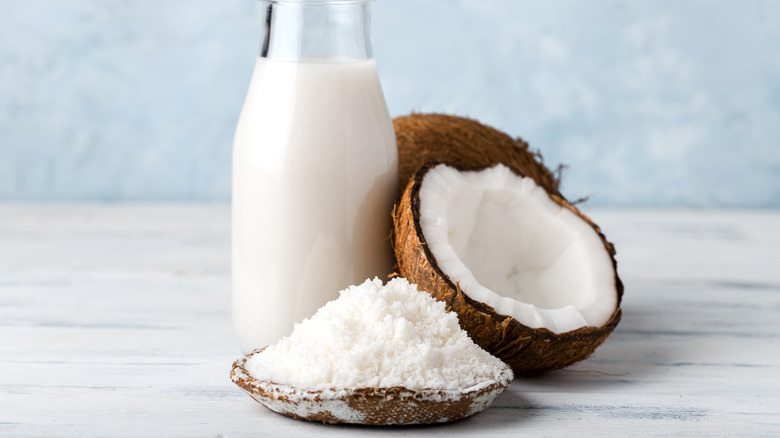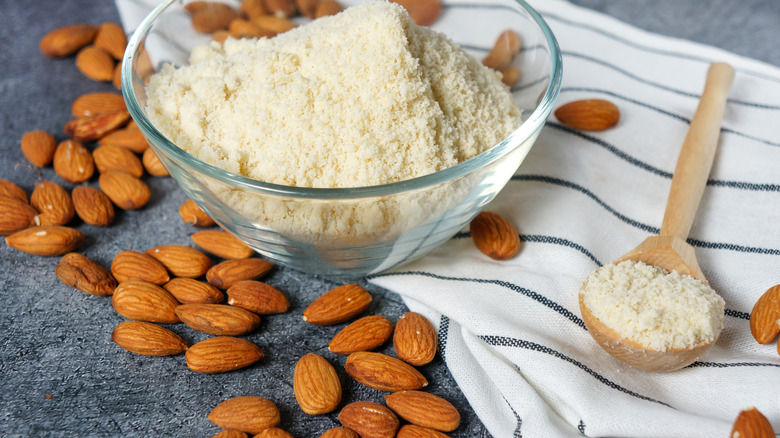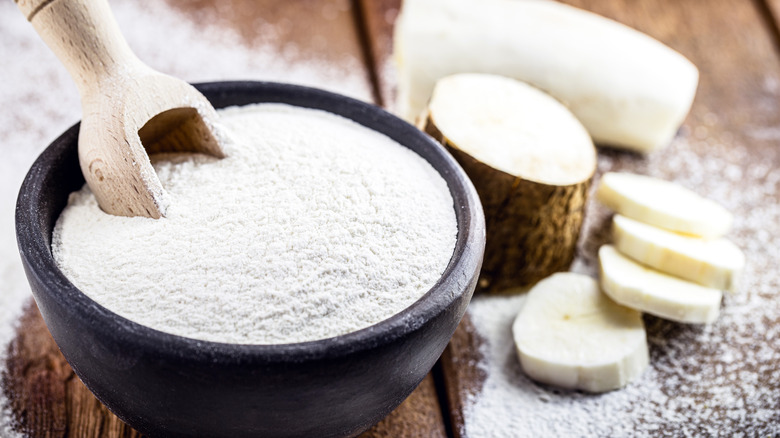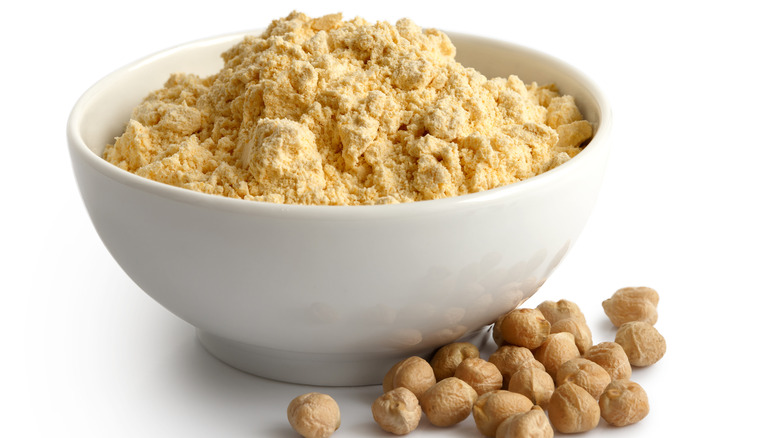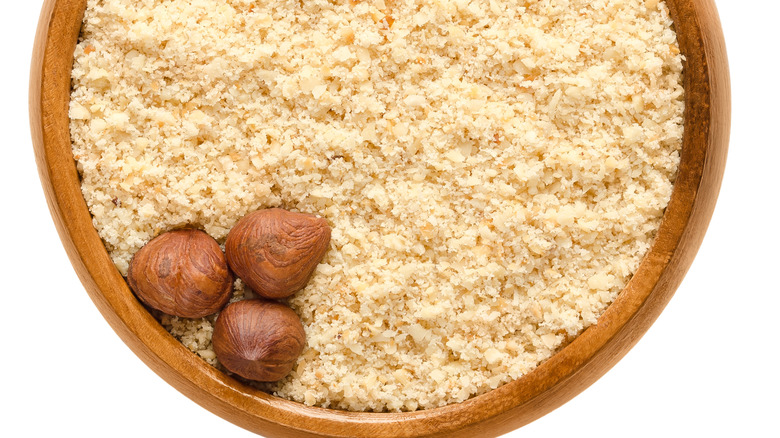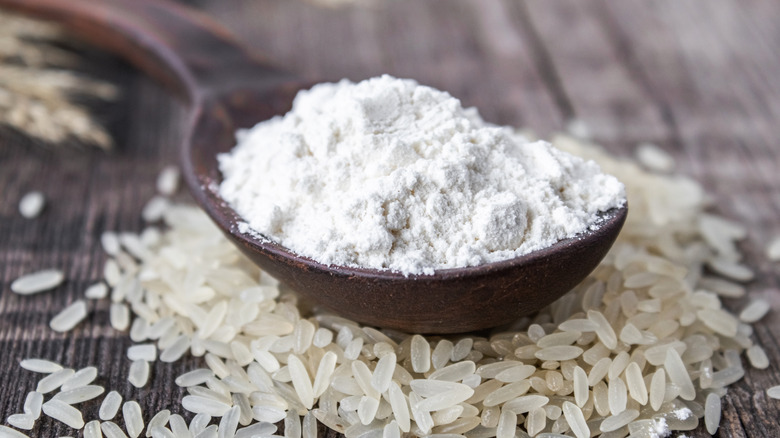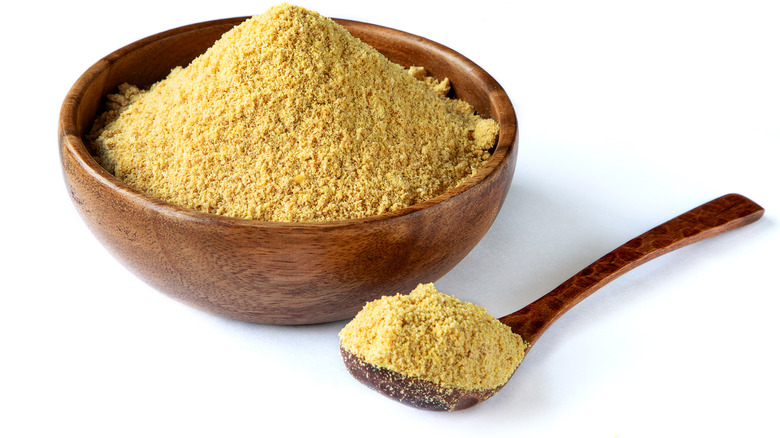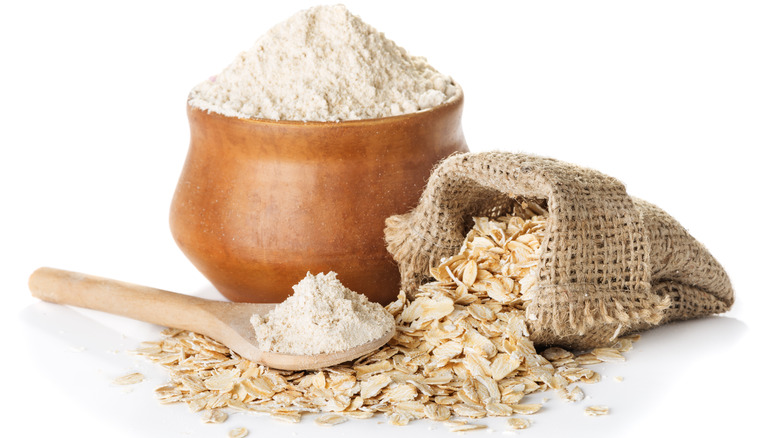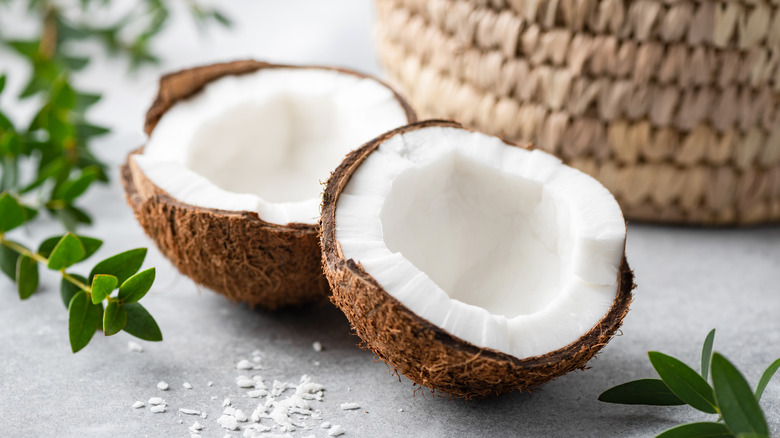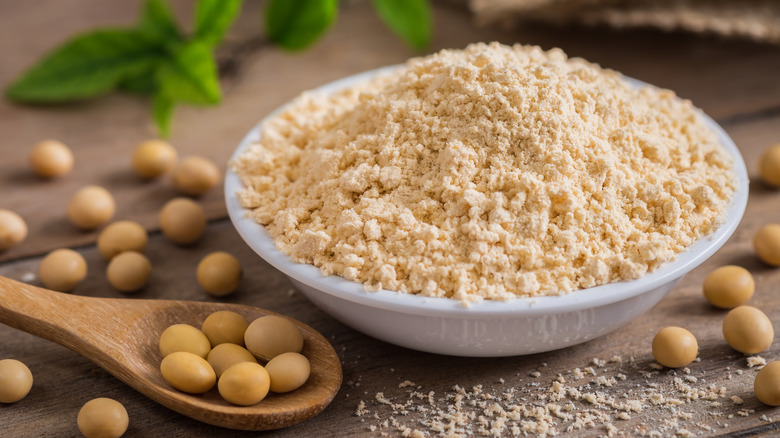10 Best Substitutes For Coconut Flour
If you love to bake or simply enjoy incorporating alternatives to standard all-purpose flour in your recipes, chances are you may have tried using coconut flour. For individuals that don't do well with gluten, it's a naturally gluten-free alternative to regular all-purpose flour, as Nourished Kitchen explains. It also contains more fat, protein, fiber, and iron than traditional flour, according to Web MD, so you'll get a few extra nutrients when using this particular type. To top it off, coconut flour has a lower glycemic index, which may be helpful in avoiding blood sugar spikes.
However, when it comes to using coconut flour, there are a few challenges. First of all, it can be a bit tough to find and it's also a pricier option, which may be of concern to budget-conscious home cooks. Additionally, as anyone who has ever used coconut flour knows, the high fiber content means it absorbs a serious amount of liquid during the baking process, according to Bob's Red Mill, so you'll likely need to keep an eye on your recipe's liquid content regardless of what substitute you're using.
Whether you've run out of coconut flour or you simply want to try something new, there are a lot of excellent substitutes that you might consider, based on your preferences and dietary needs. Here are 10 of the best options for replacing coconut flour.
1. Almond flour
Any baker that has ever tried to make delicate French macarons will likely know all about almond flour, which is one of the staple ingredients of that particular baked treat, as Sally's Baking Addiction explains. However, it's also an excellent substitute for coconut flour, according to Recipe Fairy. One plus for this substitute is that almond flour, like coconut flour, is gluten-free, so individuals with Celiac disease or gluten sensitivity should be able to enjoy dishes made with this ingredient. It's also packed with vitamin E and is rich in fiber, since almond flour is basically the same as eating almonds. Finally, those looking for a low-carb flour substitute will be pleased to know that almond flour definitely fits the bill. To top it all off, it contains a slightly sweet, nutty flavor that makes it a great substitution in baked goods.
Almond flour can be a bit on the pricier side, but if you don't want to shell out for the pre-ground version, you can also easily make your own at home by just grinding almonds down to a very fine powder. The one major thing to consider with this swap is the liquid content — unlike coconut flour, almond flour isn't supremely absorbent, so you'll need a lot more of it. For best results, Dummies suggests four times the amount, or replacing a quarter-cup of coconut flour with a cup of almond flour.
2. Cassava flour
Cassava flour is crafted from cassava root, a vegetable native to South America, according to The Kitchen Community – and it makes a great substitute for coconut flour. Cassava is packed with vitamin C, and as Downshiftology reports, it's also gluten-free and grain-free, so it's a great pick for those with particular dietary restrictions. It is, however, a bit higher in carbohydrates than some alternatives since cassava root is a starchy vegetable similar to potatoes, which may be something to consider if you're looking for a low-carb option.
The one major bonus of cassava flour is its versatility. It's quite neutral and doesn't have any notes of nuttiness or sweetness like some other substitutes, so it works very well in both sweet and savory dishes. Plus, it has a very soft texture, making it ideal for incorporating into things like silky sauces, where you don't want your flour substitute providing a grainy mouthfeel.
For the best results, as with many other substitutes for coconut flour, you'll need to use way more cassava flour in your recipe — the general rule of thumb is to use four times the amount. So, if your recipe calls for a quarter-cup of coconut flour, you'd replace it with a full cup of cassava flour.
3. Chickpea flour
Chickpeas are an amazingly versatile staple in their various forms — you can enjoy them roasted until crispy, pureed into silky smooth hummus, or whipped into a vegan egg white alternative with aquafaba, among other tricks. It turns out, they do very well when transformed into flour as well, with chickpea flour making a great substitute for coconut flour, according to My Kitchen Serenity.
Chickpea flour is well-suited to cooks that want to add a bit of extra nutrients to their dish, as the chickpea base means this flour is packed with all sorts of minerals and vitamins. While the flavor isn't too overpowering, it does have a hint of nuttiness and "bean-y" flavor notes you may notice. However, the flavor is still subtle enough that this substitute can be used in both sweet and savory dishes, and it's another naturally gluten-free option.
Given that you would substitute three-quarters of chickpea flour for every cup of all-purpose flour, and you would substitute one-quarter cup of coconut flour for every cup of all-purpose flour, you'll want to use about double the amount in this swap. So, if your recipe calls for a quarter-cup of coconut flour, you'd want to add about a half-cup of chickpea flour.
4. Hazelnut flour
You may have enjoyed this rich, decadent nut roasted or embedded in a luxurious piece of chocolate, but have you ever sampled hazelnuts as a flour? Hazelnut flour actually makes a fantastic gluten-free and vegan substitute for coconut flour, according to The Kitchen Community.
Since hazelnut flour is made from ground hazelnuts, it definitely packs some of those desired nutty flavor notes. It also has plenty of protein, fiber, healthy fats, and vitamin E, making it a nutrient-packed substitute.
However, there are a few downsides. First of all, hazelnut flour can be a bit more challenging to find than many other substitutes, and it can be a bit pricey as well. Additionally, unless you further process it by grinding the flour even more, it naturally has a bit of a gritty texture, which might impact how your dish turns out.
Its high fiber content means hazelnut flour is a bit more absorbent than some other flours, but it still doesn't hold a candle to coconut flour's liquid-absorbing capabilities. Because of this, you'll want to start by doubling the amount — so, if your recipe calls for a quarter-cup of coconut flour, you'd swap in a half-cup of hazelnut flour, and then potentially add a bit more hazelnut flour based on the specific recipe you're making and the amount of liquid it contains.
5. Rice flour
According to Recipe Fairy, rice flour makes a great substitute for coconut flour because it has quite a neutral flavor as well as a soft, fine consistency that means it will blend well in dishes. This means rice flour is a fit for a wide variety of recipes, including dishes where you want the final product to have a silky smooth texture. As an added bonus for anyone with Celiac disease or gluten sensitivities, rice flour is naturally gluten-free (via The Kitchn).
However, with this swap you'll want to be mindful of the exact kind of rice flour you're buying. Ensure you're using regular rice flour rather than sweet rice flour — the latter has a higher starch content, which is great if you're looking to use it as a thickening agent, but it may throw off the texture of your dish if you use it thinking it's regular rice flour. If you're in a pinch, you can even create your own using a grain mill (per Gluten-Free on a Shoestring).
For the best results with this substitution, you should triple the measurements — so, if your recipe called for one-third of a cup of coconut flour, you would swap in a full cup of rice flour instead.
6. Flax meal
While you might commonly sprinkle a little flax meal atop your oatmeal or into your smoothies, this likely isn't your first thought when imagining a flour substitute. However, as My Kitchen Serenity explains, flax meal can actually be a fantastic replacement for coconut flour. Flax meal is packed with healthy omega-3 fats, and even contains slightly more protein than coconut flour. If all you have on hand is whole flaxseeds, don't worry — you can easily grind them to create your own flax meal (per Julie Harrington's blog). This also helps with absorbing all the nutrients within the flax seeds (via NDTV).
One thing to consider is that flax meal has a signature nutty taste; while it isn't strong enough to overpower most flavors, if you're swapping this in a dish with very delicate flavors, you may notice the slight change in the overall profile.
For best results with this particular swap, you'll want to triple the amount called for in the original recipe. This means that if your dish requires one-third of a cup of coconut flour, you would replace that with a full cup of flax meal instead.
7. Oat flour
As Laura Fuentes explains, oat flour can be a great substitute for coconut flour. It contains all the same nutrients you'd find in regular oats, including manganese, magnesium, and fiber, according to Minimalist Baker. It also has quite a neutral flavor with just a hint of sweetness, meaning it's a versatile swap that can be easily used in sweet and savory dishes alike. However, oat flour's particular properties mean it truly shines in dishes that have a dense texture such as loaf cakes or brownies, so it's a great swap to reach for when baking.
One of the major selling points with oat flour is that it's a very economical choice. While you can find oat flour sold already ground, you can also easily grind regular rolled or even quick oats to make your own for a very budget-friendly price. And, unlike some specialty flours that can be difficult to find outside of specialty grocery stores, oats are a staple ingredient that are very accessible and available in just about any supermarket.
For the best results, you'll want to use five times the amount of oat flour as you would have used coconut flour. So, if your recipe calls for a quarter-cup of coconut flour, you would replace it with 1-1/4 cups of oat flour.
8. DIY coconut flour
If you're making a dish in which every ingredient is of critical importance and you worry that swapping out a single one could compromise the end result, you may be hesitant to swap out the coconut flour in your recipe for an alternative flour.
As noted by Don't Mess With Mama, you don't have to. You can actually make your own coconut flour (although it's definitely a more time- and effort-intensive process than simply opening a bag). To whip up your own DIY coconut flour, what you need to do is spread out coconut pulp on parchment paper and bake at a very low heat (about 120 degrees Fahrenheit) until there's no moisture remaining. Then, you blend that pulp until you've formed a fine powder, and you've got your own coconut flour to use.
Since this particular substitute is just another way to make coconut flour, it's one of the few swaps that is a direct substitute. If you've run out of your bagged coconut flour and decide to make your own, you can follow the recipe exactly — for example, using a quarter-cup of your DIY coconut flour to replace a quarter-cup of regular coconut flour.
9. Soybean flour
If you're looking to swap out coconut flour with something that's fairly high in protein, according to Butter Cream Bakeshop, soybean flour might be just the ticket. While you can find both un-roasted and roasted versions, which will impact the flavor and color of the soybean flour, both versions are crafted from soybeans that are finely ground. Since it's made from soybeans, this swap means your recipe will naturally stay gluten-free and be a low-carb flour option.
As The Spruce Eats explains, the roasted version of soybean flour is a golden hue and features nutty, toasted aromas and flavor notes, as well as a hint of natural sweetness. However, it still remains a neutral enough flour that it can be used in both sweet and savory dishes. One of the downsides of this particular flour is that it's not as easily accessible as some of the alternatives, and while you may have success finding kinako (roasted soybean flour) in specialty Asian supermarkets, a regular grocery store might not carry any type of soybean flour.
If you do get your hands on a bag, or have some in your pantry already, the swap ratio is easy to remember — simply double it. So, if your recipe calls for a quarter-cup of coconut flour, you'd add in a half-cup of soybean flour instead.
10. Tapioca flour
Tapioca flour, made from the starchy part of the cassava plant, makes a fantastic substitute for coconut flour, according to The Kitchen Community. For those curious about how exactly tapioca flour differs from cassava flour, given its origins, it simply involves the part of the plant used. As Healthline explains, cassava flour is made from the whole root rather than just the starchy portions like tapioca flour.
Coconut flour and tapioca flour are both very neutral, similar in both taste and hue, so the appearance or flavor notes of your dish shouldn't really change with this swap. It's important to note that tapioca flour is also sometimes called tapioca starch — they're the same thing, so if you have a bag of the latter in your pantry, you're good to go. The neutral flavor, aroma, and hue of this ingredient means you can use it in both savory and sweet dishes. You'll just want to be mindful of the liquid content — like coconut flour, tapioca flour is able to absorb serious amounts of liquid, so you'll want to ensure your dish doesn't dry out.
Given that both tapioca flour and coconut flour have a similar consistency and powerful ability to thicken whatever they're added to, this is one of the rare coconut flour swaps that is a direct substitution, as Gluten-Free Living claims. So, if your recipe calls for a quarter-cup of coconut flour, you'd replace it with a quarter-cup of tapioca flour — it's that simple!
